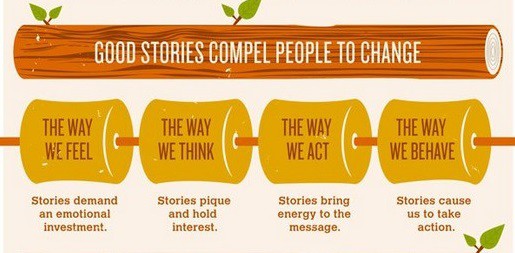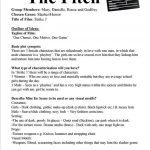4 Components In Storytelling For Screenwriting

Many people overlook storytelling in screenwriting. As a scriptwriter it is the story in your script that really gets you noticed. A strong story will hook the agents and producers of the world into reading your script, while the characters will keep them into it. You need a compelling story to allow your characters to develop and keep the reader (and eventually the viewer) emotionally involved.
By taking into account the four essential components of storytelling in screenwriting, you will be able to construct a vivid story that will certainly get you noticed by Hollywood executives.
Give Your Character a Goal
Everyone has one major goal in life. Right now yours could be to become a professional scriptwriter, and you’re trying to achieve that goal by constantly writing, reading www.www.filmscriptwriting..com, taking a scriptwriting class, etc. However this type of goal wouldn’t be very interesting to watch someone obtain. Instead give your character a goal which requires him to practically put his life on the line. Make it nigh on impossible for them to achieve their goal and see how they react.
There should be a point in the story where it seems the character will never be able to achieve their goal but then they pull out that little bit more and get the job done.
Constantly Challenge Your Character
Your story should be set at the most crucial point of your character’s life. Maybe he’s just been diagnosed with AIDS or his life is crumbling around him, he’s lost his wife, kids and job. Whatever the challenge your main character should be going through emotional and/or physical hell.
Always keep your main character on his toes. Just when things seem to be settling down throw a bigger obstacle at him. Put him in the line of fire. By constantly challenging your character you give them the opportunity to develop and improve their self by the end of the story.
Focus On How Your Character Deals With These Challenges
Which challenges does your character deal well with? Which ones does he struggle with? How does he learn from these obstacles?
Every scene in your script should be written around the journey of your main character. While you might have sub-plots the script should always be focused on your main character’s journey. This is the spine of the story, if you ignore the spine then your script won’t move.
Outer and Inner Forces
A story moves forward by conflict. Conflict is represented by two forces, inner forces and outer forces. The outer forces are often the “bad guys” but they can also be natural disasters, complicated relationships or something else. These are the physical obstacles holding your main character back. They need to make the reader wish that they could step into the script and help your character fight against them.
However it’s the internal forces that really hold back your main character. All those emotional hang-ups and neurosis that cause them to sabotage themselves. These behavioural patterns/internal forces have plagued your main character’s life and during this story they will hit him hard. So hard it hurts. But it is in beating these internal patterns that your main character derives true glory. Maybe he will learn how to accept himself or how to share his emotions. One he is free from this emotional baggage your main character can finally walk off into the sunset and lead a happy, fulfilling life.
Please CLICK HERE To Check Out My Top 5 Online Scriptwriting Courses



